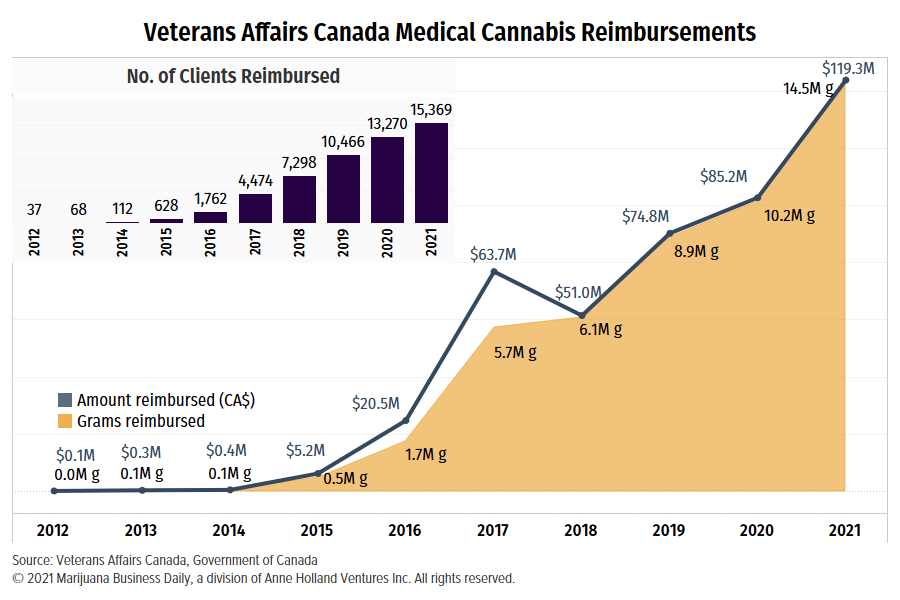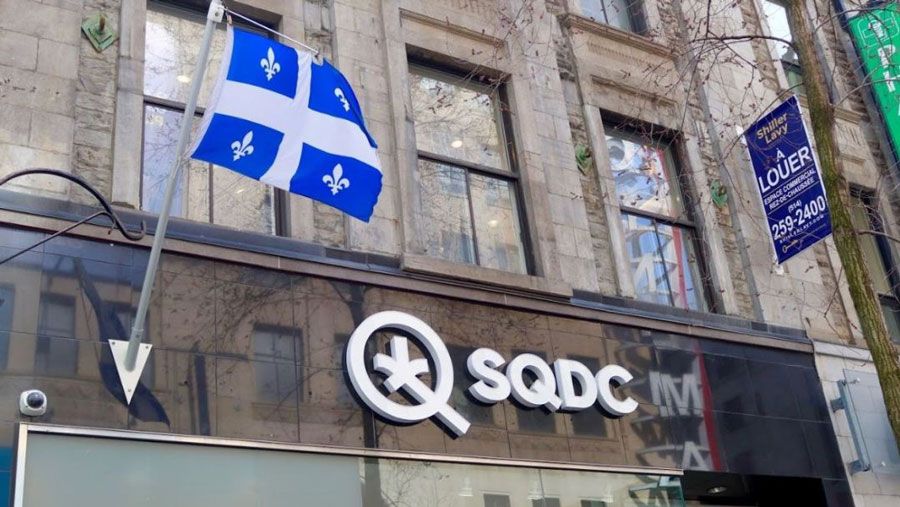Medical cannabis reimbursements by Veterans Affairs Canada reached an all-time high last year, offsetting an overall decline in spending among the general population.
In the 2020-21 fiscal year ended March 31, Veterans Affairs Canada reimbursed 15,369 clients a total of 119.3 million Canadian dollars ($100 million) for medical cannabis products, according to the latest figures from the department responsible for benefits and services for retired and serving Armed Forces members.
That’s an increase over the previous year, when 13,270 clients were reimbursed CA$85.1 million.
To put that into a global perspective, Veterans Affairs Canada’s fiscal year spending on medical marijuana exceeded Australia’s medical marijuana market in 2020, which was estimated to be worth approximately CA$100 million.
And the 14,463 kilograms (31,885 pounds) of cannabis reimbursed by Veterans Affairs Canada in 2020 was ahead of the European Union’s legal flower market that year, which dispensed approximately 10,000 kilograms.
That points to how small some of the largest medical cannabis markets outside North America remain, and how much room there is for growth.
Medical cannabis uptake by Canadian veterans comes as overall spending in Canada on the medicine has largely stagnated in recent years.
Veterans account for about a quarter of Canada’s medical marijuana market by spending.
In 2019, household spending on cannabis products for medical use was CA$618 million, falling slightly in 2020 to CA$587 million.
The Veterans Affairs Canada (VAC) figures do not include pensioners with the Royal Canadian Mounted Police – Canada’s national police service.
Opportunity
Most Canadian licensed producers devoted more of their resources to meeting demand in the recreational market after Canada ended adult-use marijuana prohibition in late 2018.
Two LPs that didn’t look the other way were Aurora Cannabis and Canopy Growth.
While the Edmonton, Alberta-based Aurora has struggled to gain a foothold in the cutthroat recreational market, its medical business is faring better than ever.
Aurora is the largest medical marijuana company in Canada by revenue, with CA$36.4 million in medical sales in its most recent quarter.
Aurora CEO Miguel Martin said veterans are a critical part of the medical business.
“Veterans serve a special role for us out of respect to their service, so we do things differently for (them) . In many cases, we are providing a concierge service to them,” he said in a phone interview with MJBizDaily.
As an example, Martin said Aurora has a stand-alone queue for veterans who phone in to the company’s call center.
“They’re clearly a critical part for us,” he said.
Spectrum Therapeutics, Canopy Growth’s medical cannabis subsidiary, also has dedicated channels to serve its Canadian veterans.
“Whether through dedicated and specialized customer support for veterans, full coverage for the best in class Storz & Bickel vaporizer, or pre-approval and direct billing, Spectrum’s Veteran Care program simplifies medical cannabis and ensures Canadian Veterans have the reliable and barrier free access they need,” Spectrum Therapeutics Head of Canada Medical Amanda Daley said in a statement.
Some of Spectrum’s Veteran Care program includes:
- Dedicated customer support for veterans from a specially trained team.
- Full coverage for vaporizers, including Storz & Bickel. This includes covering the difference between the $300 credit offered by VAC and the cost of an S&B Volcano.
- A 20% discount for anyone using medical cannabis while still serving.
If there is a cost difference beyond Veterans Affairs Canada’s reimbursement rate of CA$8.50 per gram, Canopy said it will cover it on all of its medical cannabis products.
Medical cannabis as a benefit
The military’s growing spending on medical cannabis reflects more private- and public-sector organizations covering such expenses in their corporate benefits plans.
Unifor, Canada’s largest private-sector union, partnered with licensed producer Aleafia Health late last year to provide medical cannabis coverage for its members, for instance.
Beyond the veterans market, Martin sees medical cannabis coverage continuing to grow in insurance and company benefit plans.
“I think this is going to become more mainstream, and you’re definitely going to see more coverage for patients of cannabinoids becoming streamlined,” Aurora’s Martin said.
“I don’t think medical gets as much attention as it should.”
Data on Veterans Affairs Canada’s medical cannabis reimbursements and policies can be found here.
Shares of Aurora trade as ACB on the Toronto Stock Exchange and the New York Stock Exchange.
Matt Lamers is MJBizDaily’s international editor, based near Toronto. He can be reached at matt.lamers@mjbizdaily.com.





